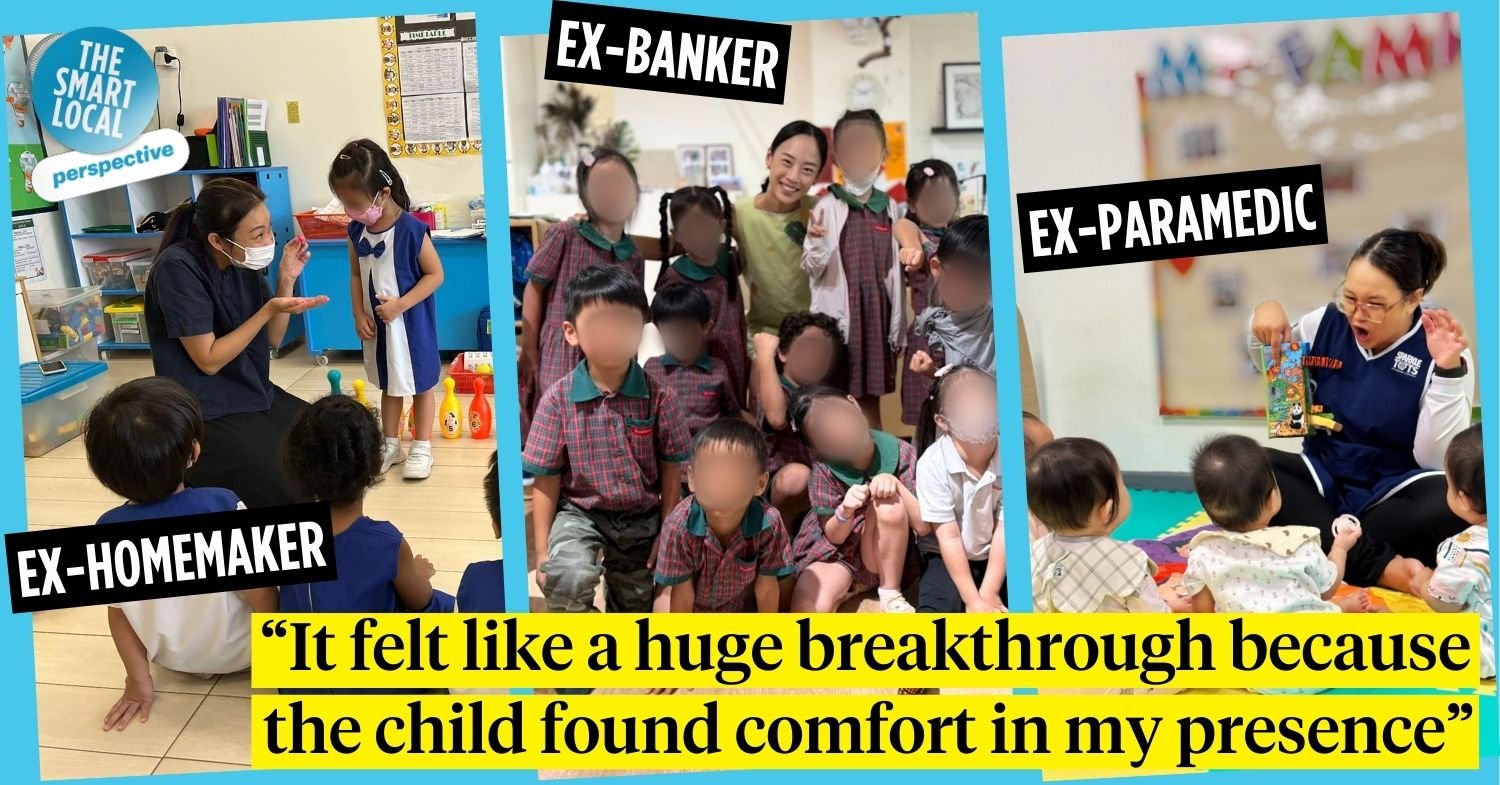NIEC conversion courses
Ask any parent, and they’ll tell you that raising a child is not easy. It truly takes a kampung to bring up a child, and their teachers are a big part of that circle of help – what with many young children enrolled in full-day care from as young as 2 months of age.
One might think, and you wouldn’t be the only one, that these preschool teachers are not regarded as professionals, unlike lawyers and bankers. “Aiya, go to school and play with children only what,” you might say. But really, what does it take to be an early childhood educator, and why would anyone give up a successful career to look after children, as some may believe?
In search of a meaningful path in life
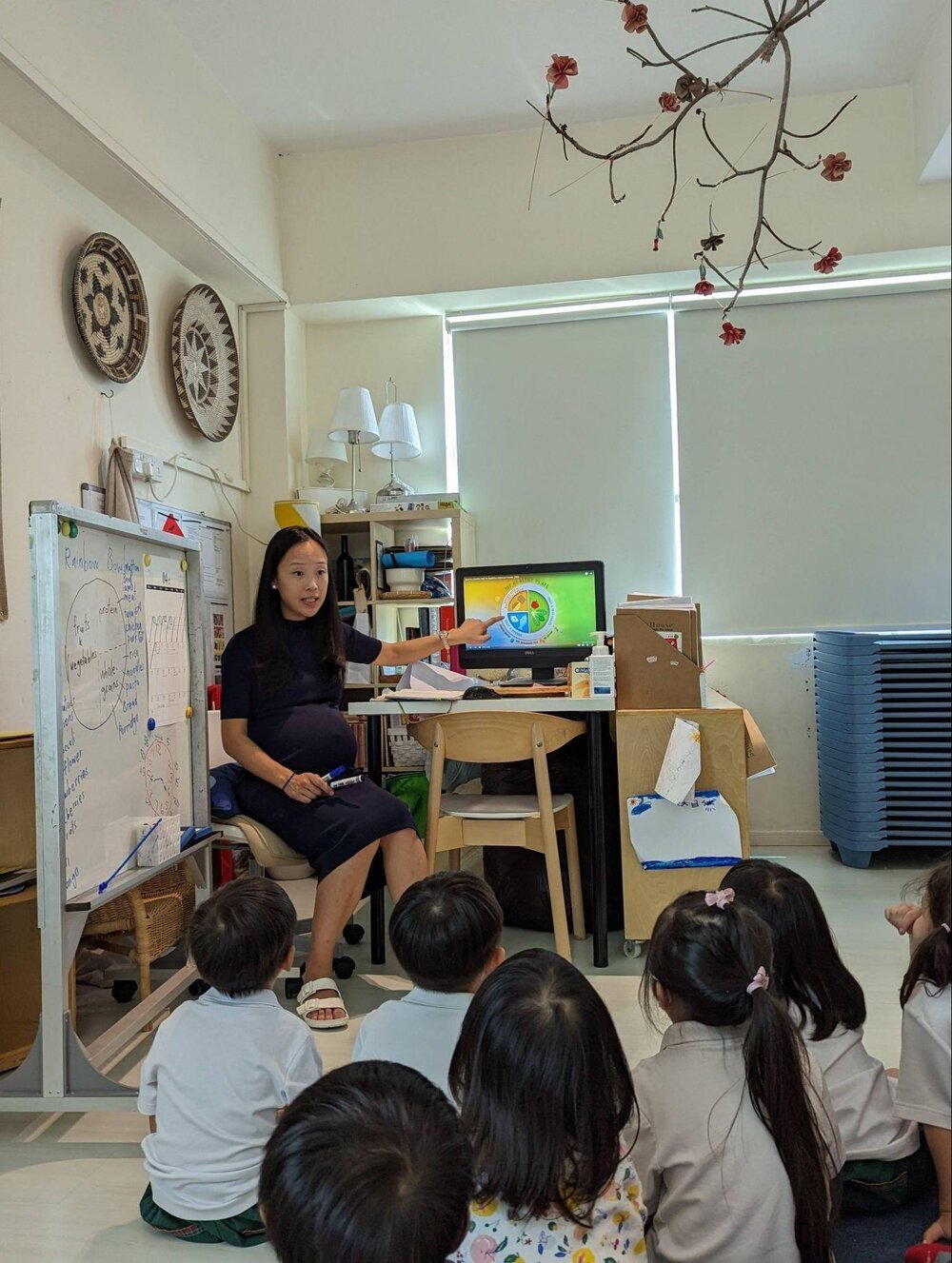
Si Qi with her class.
Image credit: Si Qi
It might be the Asian parent’s S-tier dream to have your child be a private banker, but for 36-year-old Si Qi, that high-flying corporate life started to lose its allure as she left her 20s behind. Growing up, she had aspirations of being an early childhood educator – a desire that had taken a backseat when her flair for math, plus Asian upbringing, saw her pursue Accounting and Finance, following in her parents’ footsteps.
Even in adulthood, the misconceptions about early childhood education weighed on her when she initially thought about leaving the banking industry. She looked at options in fields including physiotherapy and healthcare, before she found out about the Diploma (Conversion) in Early Childhood Care & Education – Teaching [DECCE-T (Conv)] at the National Institute of Early Childhood Development (NIEC).
This was a 13-month place-and-train course under the Career Conversion Programme (CCP), where Si Qi and her classmates were attached to a preschool for 2 days each week, spending the other 3 weekdays attending their Diploma courses. The CCP offers significant financial benefits, including course fee sponsorship and a monthly salary, allowing mid-career individuals to transition smoothly while balancing work and study.
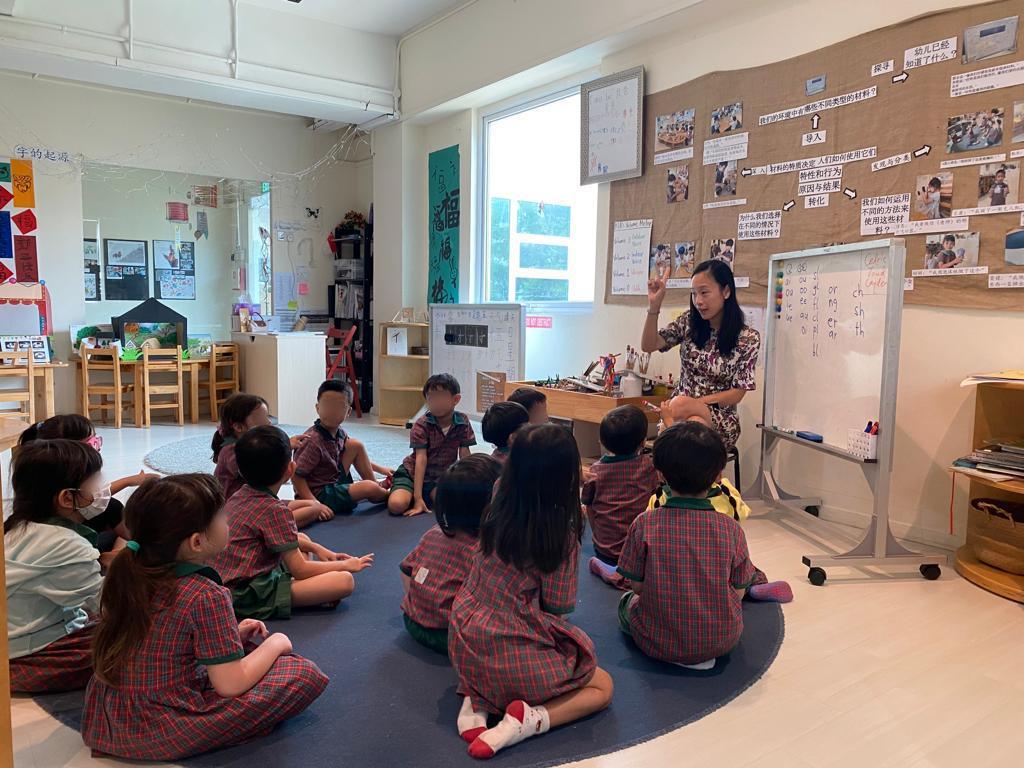
Si Qi in class.
Image credit: Si Qi
How this benefited her was the way it “enabled [her] to learn through a classroom setting, while gaining practical insight into the sector. I was on the ground and able to immediately apply and put the knowledge I’d acquired to the test.” This was accompanied by modules focusing on the development of children and child learning, which altogether helped her seamlessly transition into early childhood education.
For work-life balance & to fulfil a lifelong dream
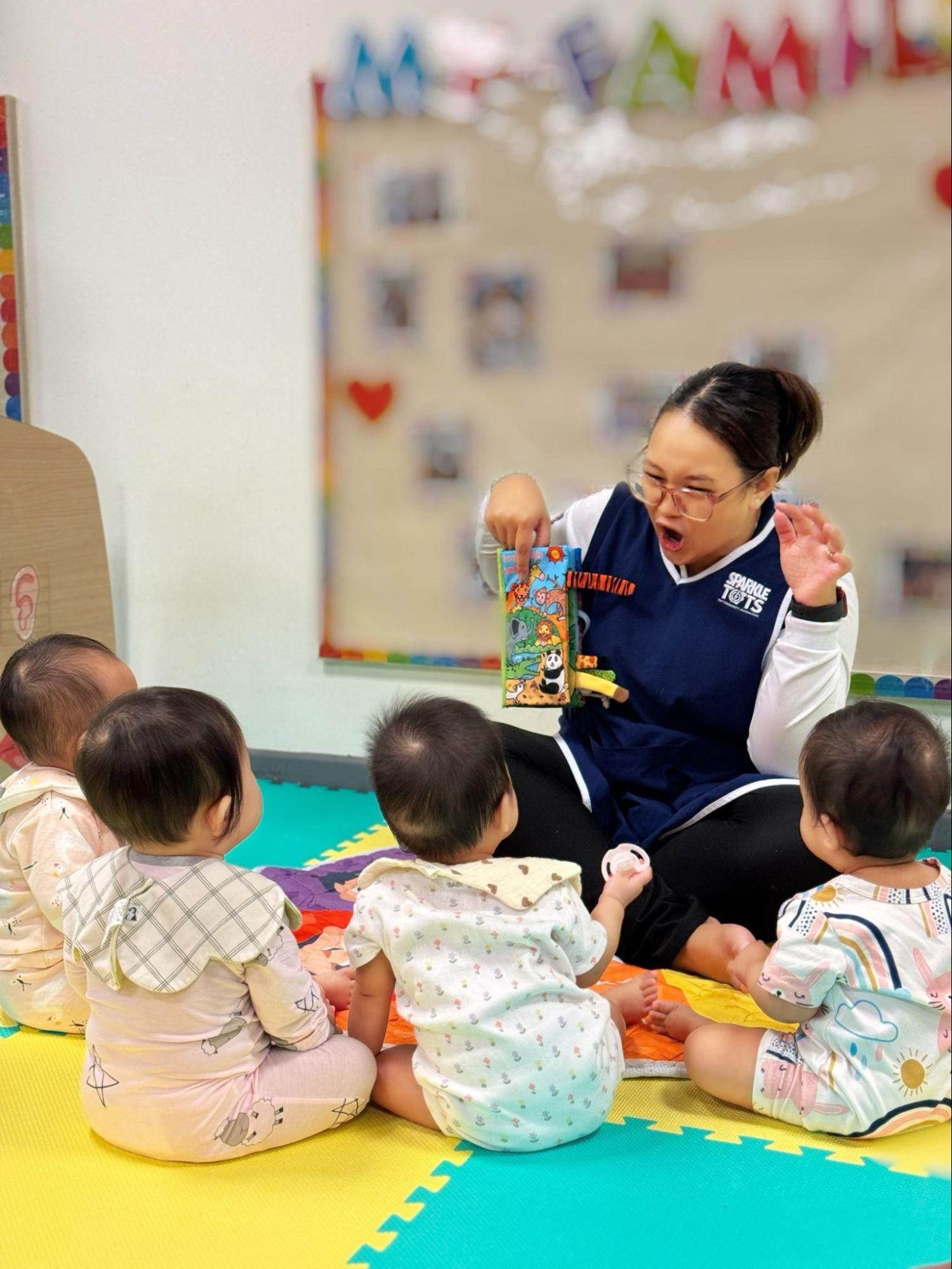
Ellina reading a book in class.
Image credit: Ellina
For 28-year-old Ellina, the step into early childhood education was both a necessity and a longtime dream come true. As paramedics, both she and her husband worked long, unpredictable shift hours, which wasn’t ideal as they wanted to start a family. This proved to be the nudge she needed to pursue her dream of becoming an early childhood educator.
“I’m deeply passionate about supporting and shaping the lives of young children,” Ellina shared, “I’ve seen the impact of early experiences on children’s well-being [in my time as a paramedic], and it made me realise how much I enjoy nurturing and supporting their growth.”
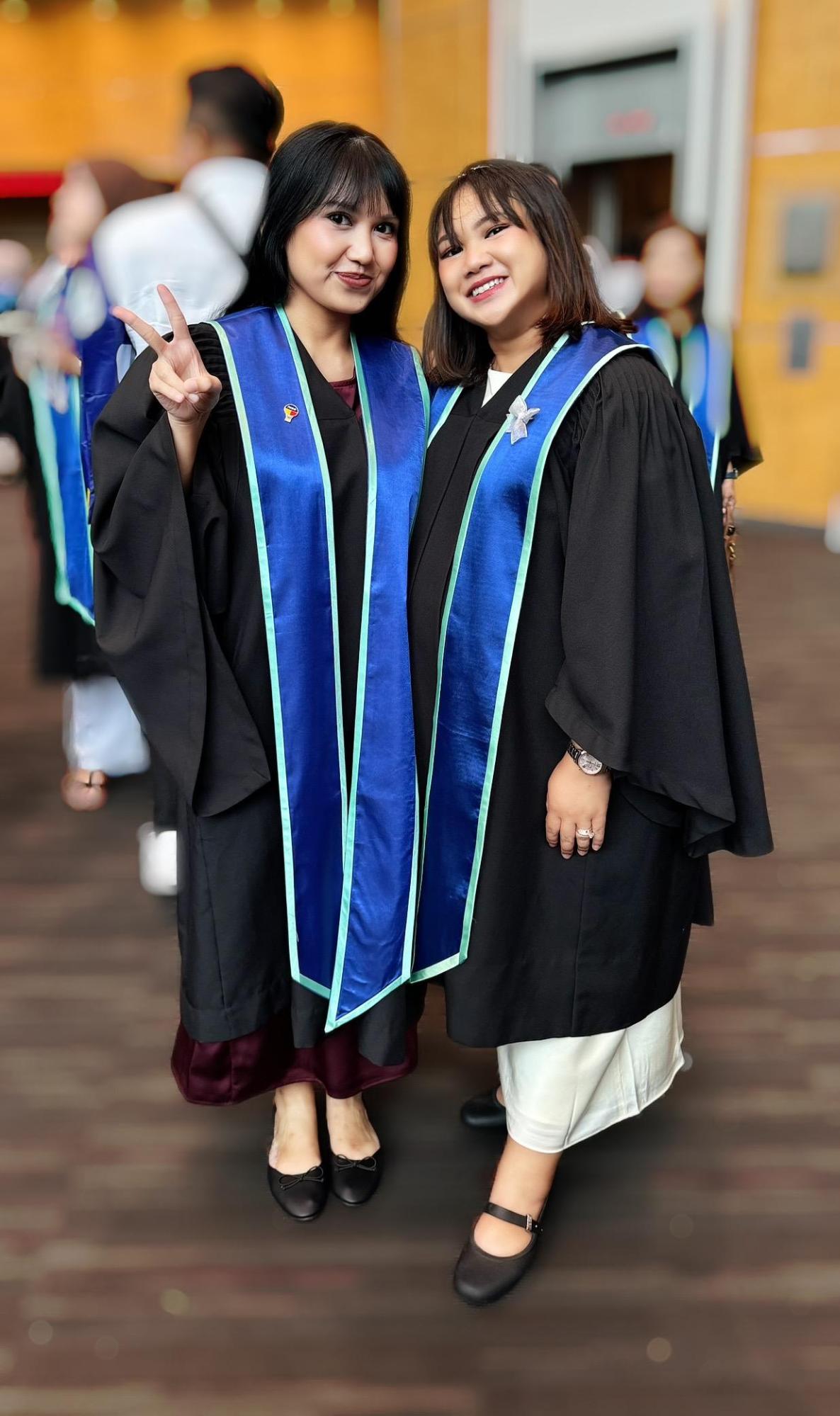
Ellina at her NIEC graduation.
Image credit: Ellina
Her decision saw her taking up NIEC’s Advanced Certificate in Early Years (ACEY) course, which equips applicants to care for children aged 2 months to 3 years. This course similarly includes practicum placements that allowed Ellina to put what she learned in the modules, into practice.
Equipped to understand & nurture even those too young to speak
Her background in paramedicine had given Ellina an essential foundation in child safety and health, but the modules covered in the ACEY equipped her to create a nurturing and engaging environment that supports the cognitive and emotional growth of very young children.
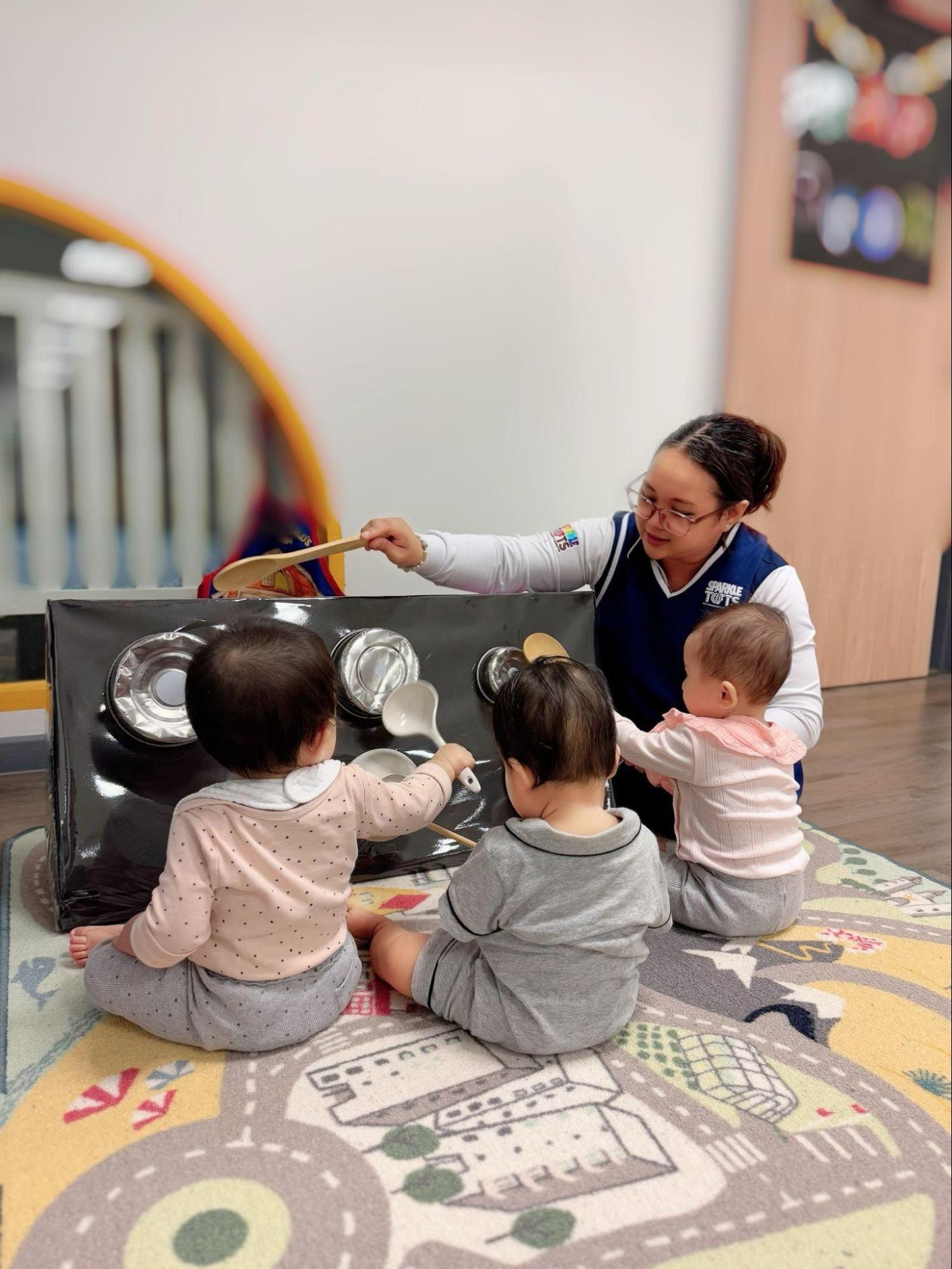
Ellina engaging her young charges with hands-on play.
Image credit: Ellina
What stood out in particular for her was the training in communication skills using scenario-based role playing in class. Working with infants and young toddlers who lack the words to express themselves meant that Ellina needed to understand non-verbal cues such as their body language, facial expressions and sounds.
For these very young children – who are exploring and learning about the world around them, yet wholly dependent on their caregivers – it’s of paramount importance that their needs are acknowledged and met. With the hands-on experience that practicum placement afforded, Ellina found herself able to understand and appreciate infants throughout their moments of happiness and frustration.
“There was one moment when I picked up the infant, and instead of the usual fussing, they relaxed in my arms,” Ellina shared about a child who was having difficulties adjusting to the new environment of day care. “It felt like a huge breakthrough because it was clear that [the baby] had started to trust me and find comfort in my presence.”
Building relationships that stand the test of time
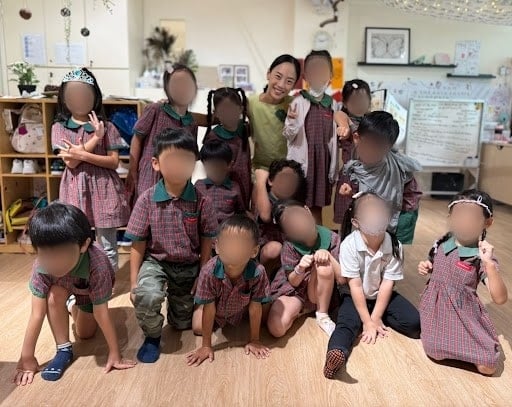
Si Qi with her class of preschoolers.
Image credit: Si Qi
For both Si Qi and Ellina, fulfilment comes in the form of watching their wards progress over the time they spent together. Si Qi, for one, has seen her class all the way through their preschool years. Where she was once struck by her NIEC lecturer’s passion to inspire the love for learning in young children, she’s now proud to know that the children in her class are happy, confident learners, even after progressing to primary school.
As a paramedic, Ellina was always on the move from one emergency to the next. Being an early childhood educator turned that around – “I have the chance to build lasting relationships with the children and their families,” she said, “There’s a sense of connection here that was harder to come by in paramedicine.”
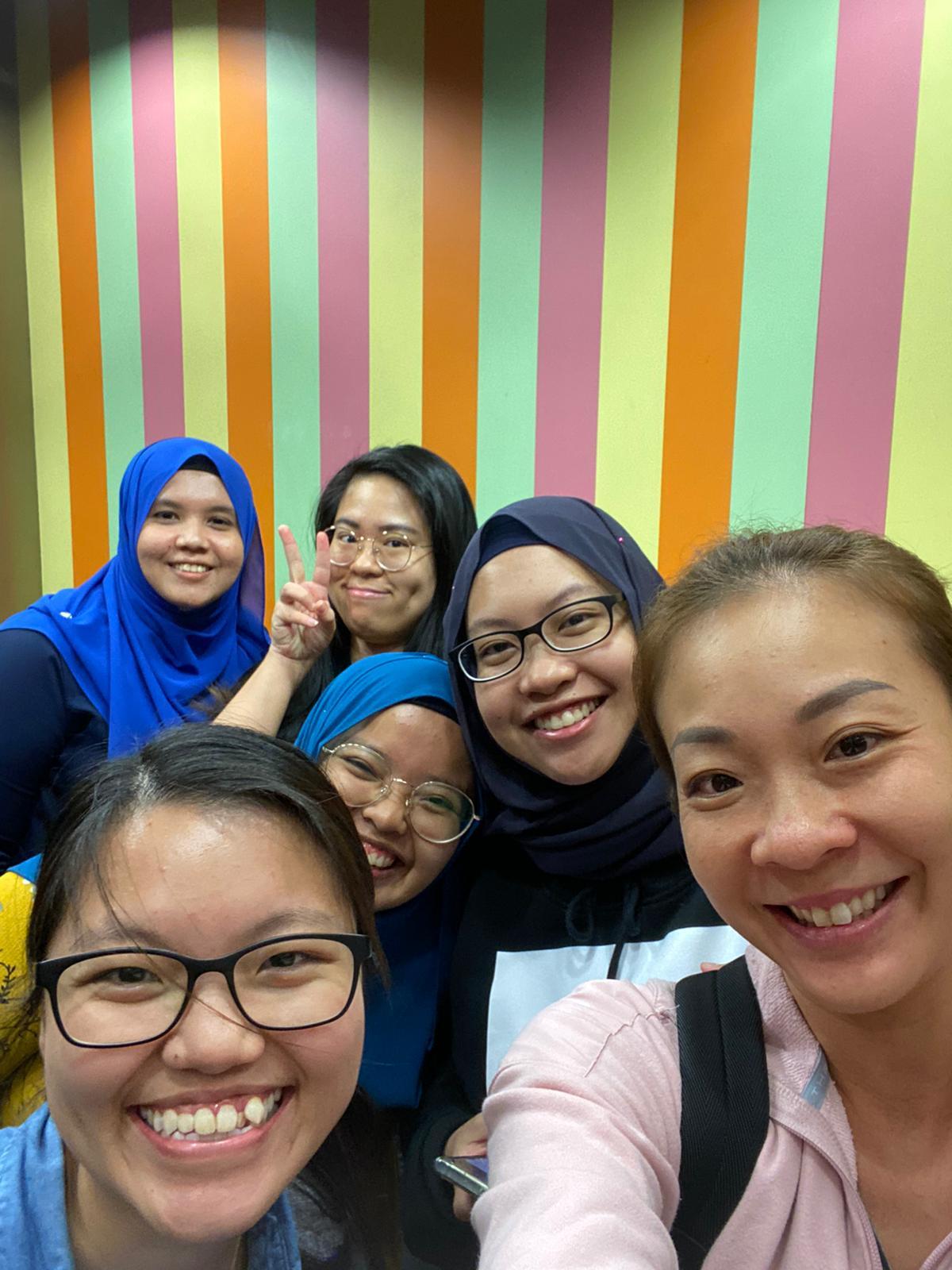
Ophelia with her coursemates.
Image credit: Ophelia
Then there’s 44-year-old Ophelia, who after 10 years of being a homemaker decided to take up a Diploma (Conversion) in Early Childhood Care & Education – Teaching [DECCE-T (Conv)] by taking part-time classes conducted on weekday evenings. This was ideal, since she was able to care for her 4 kids after their school day, before heading to class herself.
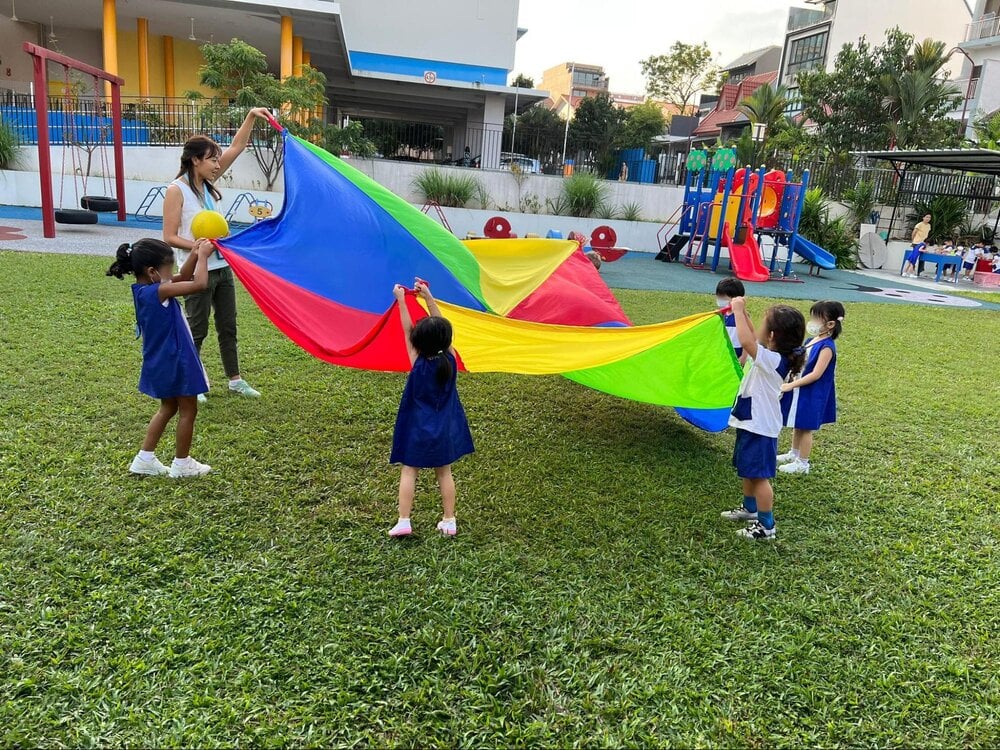
Ophelia with her class.
Image credit: Ophelia
Teaching at a church kindergarten that sees intakes of more than 300 children a year, she’s taught multiple batches of children, their siblings, and their other siblings after that. But what she’s found truly rewarding is how they’ve come back to visit during events like sports day and concerts.
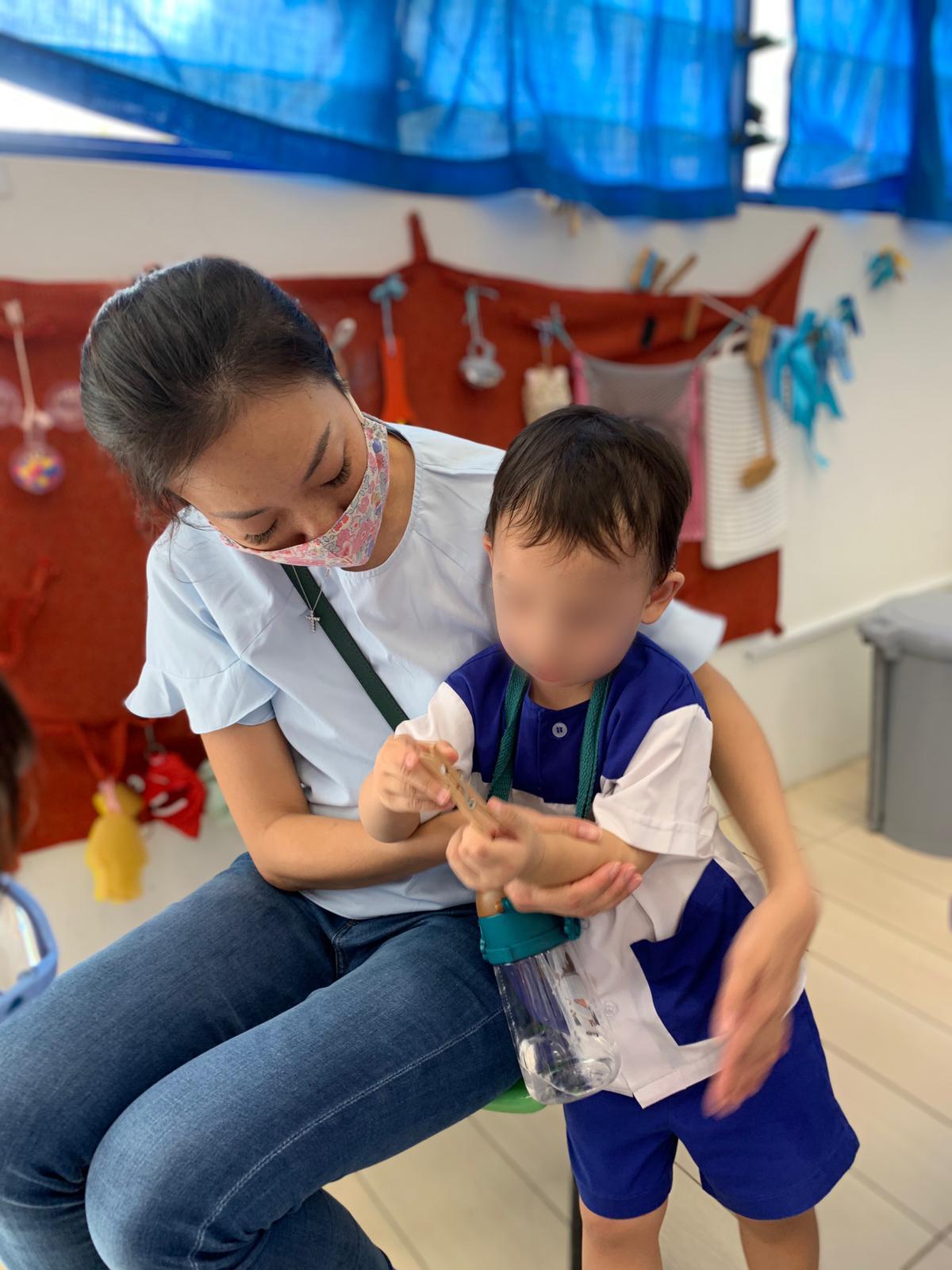
Ophelia with one of her kindergarten students.
Image credit: Ophelia
“They were so young when I taught them – you’d think they won’t remember [me], but they do. It’s been fulfilling to see them progress in life, and know that you’ve done something to have them remember you by; that you’ve been an important part of their lives.”
Respect for the job comes from within
Battling skepticism from others, and even overcoming her own reservations about joining the early childhood education sector, was a turning point for Si Qi.
“I explored many career-switch options in addition to early childhood education, initially clouded by misconceptions of the early childhood education sector, but ultimately found my way back to my childhood calling. In the same way that my private banking clients placed their trust in my expertise and integrity, I now recognise the parallel: parents entrust their children to us based on the same crucial qualities – professional knowledge and unwavering character,” she says with conviction.
“It is on us to equip and present ourselves as professionals who have the science, art, knowledge and skills to do what we are doing. As it was with my clients coming to me for banking and finance advice, as early childhood professionals, we need to be the trusted source of knowledge for families, guardians and children who need our two cents and support.”
The lecturers and more senior educators that Si Qi has met in the NIEC course fanned the flames of this passion – she credits the stories and anecdotes that they’ve shared as integral and inspirational to her journey thus far, above and beyond theoretical concepts.
National Institute of Early Childhood Development
Established in 2019, the National Institute of Early Childhood Development (NIEC) was set up by the Ministry of Education (MOE) to raise the standard of early educator training.
NIEC offers a diverse range of courses on early childhood education that cater to applicants of all ages – be it post-secondary students, people looking for a mid-career conversion, or even existing early childhood educators looking to gain more expertise.
This includes courses like the Higher Nitec in Early Childhood Education at the Institute of Technical Education (ITE), or the Diploma in Early Childhood Development & Education at Ngee Ann Polytechnic, and Temasek Polytechnic for secondary school graduates.
On the other hand, the career conversion courses for mid-career switchers allow these applicants to work and study at the same time, drawing a salary and being sponsored for their entire course of study. There’s a variety of class timings as well, with part- and full-time options to cater to applicants’ needs.
There are courses for current early childhood educators too, in the form of Continuing Professional Development (CPD) courses to help them stay up to date with the latest teaching practices. These courses, covering areas such as Outdoor Learning, Inclusive Practice, Leadership, and Mother Tongue Languages, allow educators to continually enhance their skills and better support the development of young children. With flexible options to suit their schedules, educators can upgrade their expertise while concurrently fulfilling their professional responsibilities.
Whichever course one applies for at the NIEC, it includes on-the-ground training through practicum attachments – nothing beats learning through hands-on experience that complements paper learning, taught by a faculty of deeply passionate and experienced early childhood educators themselves.
Mid-career conversion courses to early childhood education at NIEC
Cliched and over-sung as it is, Whitney Houston certainly hit the nail on the head when she sang that “the children are our future” – and it’s imperative that we give early childhood education the reverence and attention our children and their futures deserve. The science backs this up: more than 1 million neural connections are formed every second in the first few years of a child’s life – a feat of nature that will never happen again in every human’s lifetime.
As such, the wealth of potential in every child is centred around the quality of their early childhood experience. It’s when the foundations for their learning, their behaviour, their physical and mental health into their teenage years and adulthood are laid.
Being an early childhood educator is so much more than ensuring the child is looked after for the duration of the school day – you are the hand that shapes who and what they become; the potter to their clay.
“Watching a child’s face light up when they’ve learned something new or achieved a milestone is incredibly fulfilling,” Ellina reflects. Indeed, there’s nothing more precious than the unbridled innocence of childhood, and maybe that’s a fulfilment that you didn’t know you sought, too.
Find out more about NIEC’s courses here
This post was brought to you by the National Institute of Early Childhood Development (NIEC).
Cover image adapted from: Ophelia, Ellina, Si Qi
